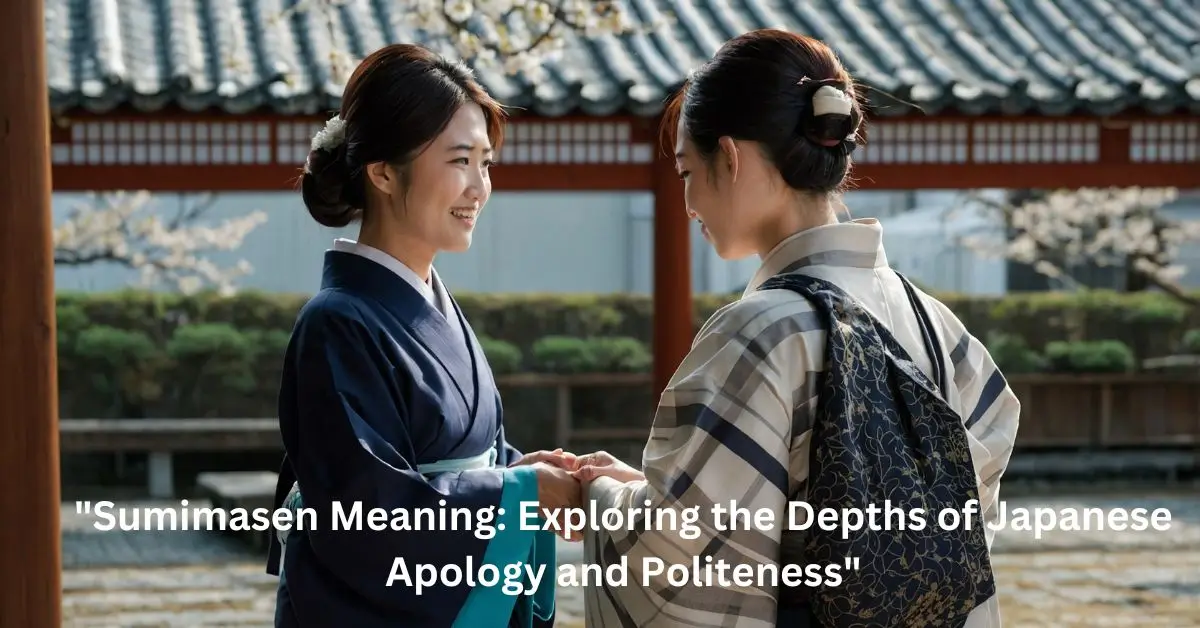When navigating the Japanese language, one of the first phrases learners encounter is “sumimasen”. Its versatility and cultural significance make it an essential part of daily communication in Japan. For non-native speakers, however, understanding its true meaning and applications can be somewhat perplexing. In this article, we will explore the many dimensions of “sumimasen,” its usage, cultural implications, and how it compares with similar phrases.
The Basic Sumimasen Meaning
At its core, “sumimasen” is a phrase used to express apology or gratitude in Japanese. However, translating it directly into English doesn’t do justice to its wide range of applications. While often rendered as “excuse me,” “I’m sorry,” or “thank you,” these English equivalents do not capture its full contextual depth.
The word itself derives from the verb “sumu” (済む), which means “to finish” or “to be complete.” When negated as “sumimasen,” it implies that something remains unfinished or unsettled. This nuance reflects a sense of guilt or responsibility, which is why “sumimasen” is so commonly used to apologize or acknowledge inconveniences.
Apology and Responsibility
Apologizing is one of the most common contexts in which “sumimasen” is used. In Japan, where politeness and social harmony (known as “wa”) are highly valued, acknowledging even minor inconveniences is important. “Sumimasen” functions as an acknowledgment that you have caused some level of disruption or trouble.
For example, if you accidentally bump into someone on a crowded train, you would say, “Sumimasen” to express regret. Unlike the casual English “sorry,” “sumimasen” carries a heavier weight, as it implies a recognition of the discomfort or inconvenience caused.
Similarly, if you ask someone for a favor, even a small one, you might preface the request with “sumimasen” to show that you are aware you are imposing on their time or energy.
Examples:
- “Sumimasen, can you pass the salt?”
- “Sumimasen, I’m running late.”
- “Sumimasen, could I ask you a question?”
In these cases, the use of “sumimasen” goes beyond mere apology—it also conveys a sense of humility and awareness of social obligations.
Gratitude and Appreciation
Interestingly, “sumimasen” is not limited to apologizing; it can also be used to express gratitude, particularly in situations where the speaker feels indebted or grateful for someone’s help or consideration.
In such contexts, “sumimasen” conveys a mixture of appreciation and apology. By saying “sumimasen,” the speaker acknowledges that the person went out of their way to offer help or perform a service, and the speaker feels a sense of guilt or obligation for having inconvenienced them.
For example, if someone holds the door open for you, instead of saying “thank you” (“arigatou”), you might say “sumimasen.” This reflects not just gratitude, but also an awareness that the other person has taken the time to do something kind for you.
Examples:
- Someone buys you a gift, and you respond with “Sumimasen!”
- A friend helps you carry something heavy: “Sumimasen, thank you for helping!”
This duality makes “sumimasen” an interesting word in Japanese. It’s one of the few expressions in the language that blends apology with gratitude, which is a testament to Japan’s emphasis on maintaining social harmony.
Politeness and Formality in Japanese Culture
Japan’s social structure places great emphasis on politeness, and “sumimasen” is a key tool in this system. Its versatility allows speakers to express humility and maintain good relations with others. Whether you’re apologizing or expressing gratitude, “sumimasen” shows respect for the feelings and efforts of others.
This is especially important in business contexts or formal situations. “Sumimasen” is more neutral and polite than “gomen nasai” (another form of “sorry” that we will discuss later), making it appropriate for interactions in which a high level of decorum is required. It can be used with colleagues, superiors, clients, and strangers alike.
In public settings, such as restaurants or stores, “sumimasen” is often used to get someone’s attention. Calling a waiter to your table or politely asking for assistance in a shop can be done using “sumimasen” rather than the more informal “hey” or direct commands often heard in Western cultures.
Examples:
- “Sumimasen, could I get the check?”
- “Sumimasen, where is the restroom?”
In these situations, “sumimasen” is an indispensable tool for politely navigating social interactions.
“Sumimasen Meaning” vs. “Gomen Nasai”
One point of confusion for Japanese learners is the difference between “sumimasen” and “gomen nasai” (ごめんなさい). Both phrases are used to apologize, but they have different levels of formality and nuance.
“Gomen nasai” is more casual and is often used in situations involving friends or close acquaintances. It translates more directly to “I’m sorry,” and carries a more personal tone, whereas “sumimasen” is often more neutral or respectful. “Gomen nasai” can also be shortened to “gomen” in very informal situations.
Example:
- “Gomen nasai, I forgot your birthday!”
- “Gomen, I’m late for our meeting.”
“Sumimasen,” by contrast, can be used in both formal and informal settings, making it more versatile and respectful in a wider range of interactions. It’s not uncommon for someone to say “sumimasen” in a business meeting or when addressing a stranger, whereas “gomen nasai” might be too casual.
Cultural Context: Why “Sumimasen Meaning” Matters
Understanding when and how to use “sumimasen” is crucial for anyone looking to engage with Japanese culture. Japan places a strong emphasis on collectivism, meaning that individual actions are often considered within the context of how they affect the group. By using “sumimasen,” the speaker acknowledges their place in a social system where interpersonal harmony and mutual respect are paramount.
This idea of preserving harmony, or “wa”, is a core value in Japan. Saying “sumimasen” isn’t just about apologizing or thanking someone—it’s about demonstrating an understanding of the social fabric and one’s role in maintaining it. Even in everyday encounters, the simple act of acknowledging another person’s time or effort with “sumimasen” fosters a culture of mutual respect.
In fact, in Japan, it’s not uncommon to hear “sumimasen” multiple times in a single interaction, as people strive to show consideration for one another. This frequent use of the phrase can seem excessive to outsiders, but it’s an integral part of the politeness that permeates Japanese society.
Alternatives and Variations of “Sumimasen”
Though “sumimasen” is widely used, there are other phrases in Japanese that serve similar functions but with subtle differences in tone and meaning.
- “Shitsurei shimasu” (失礼します) – This phrase means “excuse me for being rude” or “I’m going to be rude,” and it is often used when interrupting someone or leaving a formal setting. It is considered very polite and respectful.
- Example: “Shitsurei shimasu, may I interrupt for a moment?”
- “Osore irimasu” (恐れ入ります) – This is a more formal and humble way of expressing apology or gratitude, often used in business settings or when addressing customers. It literally translates to “I am afraid of troubling you,” which shows deep humility.
- Example: “Osore irimasu, could you assist me with this issue?”
- “Arigatou gozaimasu” (ありがとうございます) – This is the formal way of saying “thank you,” but in situations where you want to show deep appreciation without the implied guilt of “sumimasen,” this may be more appropriate.
- Example: “Arigatou gozaimasu for your kind words.”
Each of these alternatives has its place in Japanese communication, but “sumimasen” remains the most versatile and commonly used expression for blending apology and gratitude.
The Global Appeal of “Sumimasen”
As Japanese culture has spread around the world through its media, traditions, and global presence, words like “sumimasen” have gained attention. For foreigners living in or visiting Japan, mastering the use of “sumimasen” is often a crucial part of fitting into society. It allows non-native speakers to navigate social interactions smoothly and shows respect for the local culture.
Even beyond Japan, “sumimasen” is appreciated for its reflection of humility and politeness, concepts that are valued universally. By understanding the layers of meaning behind “sumimasen,” one gains not only language skills but also insight into the mindset of a culture that prioritizes harmony, respect, and consideration for others.
Conclusion
“Sumimasen” is much more than just an apology or an expression of gratitude. It’s a cultural marker, reflecting the complex social dynamics of Japan. Whether you’re apologizing for a mistake, thanking someone for their kindness, or simply trying to get someone’s attention, “sumimasen” serves as a bridge to maintaining positive social interactions.
For language learners, understanding the full meaning of “sumimasen” is an important step in grasping Japanese culture and etiquette. Its nuances offer a glimpse into the values of respect, humility, and collectivism that define the nation. As you continue to explore the Japanese language, remember that each “sumimasen











